1.1 All schools must provide a curriculum that is broadly based, balanced and meets the needs of all pupils. Under section 78 of the Education Act 2002 and the Academies Act 2010, a PSHE curriculum:
· Promotes the spiritual, moral, cultural, mental and physical development of pupils at the school and of society
· Prepares pupils at the school for the opportunities, responsibilities and experiences of later life.
1.2 An amendment to the Children and Social Work Act 2017 made Relationships and Health Education at primary; and Relationships, Sex, and Health Education at secondary, statutory subjects. The DfE guidance on Relationships, Health and Sex Education for governing bodies can be seen here. This became active from September 2020.
1.3 The current statutory PSHE documentation is here. In July 2024 the consultation closed for the new guidance – a summary of this draft statutory guidance can be found here. This policy is also underpinned by a range of other legislation and guidance – please see appendix 1 for a full list and links to the additional documentation.
2.1 The aims of the policy are:
· To provide pupils with the knowledge, understanding, attitudes, values and skills they need in order to reach their potential as individuals and within the community, and to make sense and meaning of themselves and their world, to gain a sense of self, sense of place and develop self-agency to enable them to make positive choices in life and their community.
· To enable pupils to be healthy, safe and informed young people, who can make positive life choices and prepare for the physical and emotional changes they will encounter as they grown into young adults.
2.2 Pupils take part in a variety of learning opportunities across and beyond the curriculum, contributing fully to the life of their school and communities and being active citizens. In doing so they learn to recognise their own worth, work well with others, and form positive relationships, and become increasingly responsible for their own learning. They reflect on their experiences and understand how they are developing personally and socially, tackling many of the spiritual, moral, social and cultural issues that are part of growing up. They become aware of their own feelings and the feelings of others. They also develop their own opinions and values, and recognise that the opinions and values of others may be different from theirs.
2.3 They learn to understand and respect our common humanity; diversity and differences so that they can go on to form the effective, fulfilling relationships that are an essential part of life and learning.
2.4 The Cabot Learning Federation is committed to, recognises, and celebrates diversity and intersectionality, including that which exists within our pupil and staff populations and the communities we serve. We are committed to advancing equal opportunities for all and eliminating discrimination on any basis, including age, disability, gender reassignment, marriage and civil partnership, pregnancy and maternity, religion or belief, sex and sexual orientation (defined as Protected Characteristics) so that equality, diversity and inclusion (EDI) underpin all we do. In relation to the enactment of this policy, this commitment and celebration of diversity will include:
· Develop an understanding of, recognise and respect a range of family groups, including marriage, civil partnerships including same sex relationships, long term partnerships, single parent families and fostered and adopted families.
· Respect our culturally and socially diverse communities and challenge any prejudice and discrimination when it occurs, in line with our HEART values across the trust.
· Understand the democratic process that protects individual liberty.
2.5 In our schools we choose to deliver Personal, Social, Health Education using Jigsaw and other resources and source materials. Academies will need to check the overview content highlighted below, and adapt as appropriate for local context. This is a mindful approach to PSHE. This is supplemented with additional resources where appropriate. Many of the Primary and some Secondaries in the CLF use Jigsaw, or the PSHE Association framework.
2.6 Jigsaw is used as a resource in many of our Primaries.
2.6.1 Jigsaw covers all areas of PSHE for the primary phase, as the table below shows: (individual academies to order)
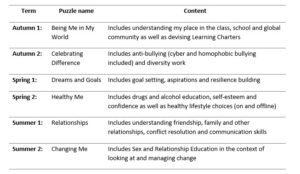
3.1 Definition:
3.1.1 From September 2020, Relationships Education is compulsory for all primary schools as set out in the DfE Guidance (2019). For all maintained schools there is also a statutory duty to provide Health Education. This includes primary aged children learning about the ‘changing adolescent body’, included in the expected outcomes for primary Health Education. (Relationships Education, Relationships and Sex Education, and Health Education, DfE, 2019).
3.1.2 Effective Relationships, Health and Sex Education can make a significant contribution to the development of the personal skills needed by pupils if they are to establish and maintain relationships. It also enables children and young people to make responsible and informed decisions about their health and well-being. This is why the DfE recommend:
“… that all primary schools should have a sex education programme tailored to the age and the physical and emotional maturity of the pupils. It should ensure that both boys and girls are prepared for the changes that adolescence brings and – drawing on knowledge of the human life cycle set out in the national curriculum for science – how a baby is conceived and born.” (Relationships Education, Relationships and Sex Education, and Health Education, DfE, 2019, para 67).
3.2 Compulsory aspects of Relationships, Sex and Health Education.
3.2.1 End of primary expectations and curriculum content is given in the Relationships Education, Relationships and Sex Education, and Health Education DfE guidance (2019). These are available in Appendix 1. The new DRAFT guidance (2024) sets out a series of age restrictions for content taught – and this is one of the aspects of the draft guidance that is currently being contested by various campaign groups.
3.2.2 The sex education contained in National Curriculum science (Key Stages 1–4) is compulsory.
· ‘All children, including those who develop earlier than average, need to know about puberty before they experience the onset of physical changes’ (1.13)
· Children should learn ‘how a baby is conceived and born’ before they leave primary school (1.16)
3.2.3 RHSE plays a very important part in fulfilling the statutory duties all schools have to meet. RHSE helps children understand the difference between safe and abusive relationships and equips them with the skills to get help if they need it. It also teaches them about the importance of a healthy lifestyle and positive mental health, about online and off line safety. Schools have responsibilities for safeguarding and a legal duty to promote pupil well-being (Education and Inspections Act 2006 Section 38).
· RHSE is an important part of Personal, Social, Health Education (PSHE) (DfE, 2014).
· When any school provides RSHE they must have regard to the Secretary of States guidance; this is a statutory duty. Ofsted will evaluate how schools help to ensure a healthy lifestyle for their children (Ofsted, 2019, Education Inspection Framework Para 28).
3.2.4 RHSE has clear links with other school policies aimed at promoting pupils’ spiritual, moral, social and cultural development, including:
· Anti-Bullying Policy
· Behaviour Policy
· Disability Equality Policy & Accessibility Plan
· Health and Safety Policy
· Information Security Policy
· Inclusion Policy
· Safeguarding/Child Protection Policy
· Special Educational Needs Policy
3.3 The role of the Principal, Academy Council and CLF Board
3.3.1 It is the responsibility of the CLF board to ensure that as well as fulfilling their legal obligations, the boards should also make sure that:
• all pupils make progress in achieving the expected educational outcomes in regard to RHSE;
• RHSE is well led, effectively managed and well planned;
• the quality of RHSE provision is subject to regular and effective self-evaluation;
• teaching is delivered in ways that are accessible to all pupils with SEND;
• clear information is provided for parents and carers on the subject content and the right to request that their child is withdrawn; and,
• the subjects are resourced, staffed and timetabled in a way that ensures that the school can fulfil its legal obligations
· Monitor the RHSE policy on an annual basis
3.3.2 The Principal liaises with external agencies regarding the school RHSE programme and ensures that all adults who work with children on these issues are aware of the school policy, and that they work within this framework. The Principal monitors this policy on a regular basis and reports to the Academy Council, when requested, on the effectiveness of the policy. Parents have been consulted on the RHSE policy into practice and provision and have the opportunity to express their views.
3.4 Equalities
3.4.1 The Equality Act 2010 determines the way the curriculum is delivered, as schools and other education providers must ensure that issues are taught in a way that does not subject pupils to discrimination, and in a way which supports a clear understanding of the protected characteristics under the Equalities Act 2010. Schools have a duty under the Equality Act to ensure that teaching is accessible to all children and young people, including, when thinking specifically about Relationships, those who are lesbian, gay, bisexual and transgender (LGBT). Inclusive RHSE will foster good relations between pupils, tackle all types of prejudice and promote understanding and respect. The Department for Education has produced advice on The Equality Act 2010 and schools (DfE, 2014b).
3.4.2 Schools have a legal duty to promote equality (Equality Act, 2010) and to combat bullying (Education Act, 2006) (which includes homophobic, sexist, sexual and transphobic bullying) and Section 4.2 of the national curriculum (2014) states “Teachers should take account of their duties under equal opportunities legislation that covers race, disability, sex, religion or belief, sexual orientation, pregnancy and maternity, and gender reassignment.”
3.4.3 “Schools should be alive to issues such as everyday sexism, misogyny, homophobia and gender stereotypes and take positive action to build a culture where these are not tolerated, and any occurrences are identified and tackled. Staff have an important role to play in modelling positive behaviours. School pastoral and behaviour policies should support all pupils.” (DfE, 2019)
3.5 Jigsaw RSE sample content – the detail of the content mapped out using Jigsaw is included within the appendix
3.6 Withdrawal from Relationship and Sex Education lessons
3.6.1 Parents/carers have the right to withdraw their children from Sex Education provided at school except for those parts included in statutory National Curriculum Science and that included within Statutory Relationships and Health Education. Those parents/carers wishing to exercise this right are invited in to see the Principal in school who will explore any concerns and discuss any impact that withdrawal may have on the child. Withdrawal will be monitored across the trust to enable us to work positively and proactively with families and community groups. Once a child has been withdrawn they cannot take part in the specific sex education lessons (this does not include the science lessons) until the request for withdrawal has been removed. Materials are available to parents/carers who wish to supplement the school sex education programme or who wish to deliver sex education to their children at home. Parents and carers cannot withdraw from any aspect of Relationships Education and Health Education lessons covering the changing adolescent body (puberty).
3.7 Working with parents and carers
3.7.1 The government guidance on Relationships, Sex Education and Health Education (DfE, 2019) emphasises the importance of schools working in partnership with parents and carers. The draft 2024 guidance reinforces the requirement to consult with parents/carers and to ensure curriculum content is available for parents/carers to view. We would extend this to recognise the curriculum content materials should be available to a wider group – in line with the recommendations from the PSHE Association. Parents/carers should be aware that schools are legally required to provide a broad and balanced curriculum. Sex, health and relationships topics can arise incidentally in other subjects, such as Science, Geography, History, RE, and it is not possible to withdraw pupils from these relatively limited and often unplanned discussions. Parents should be given every opportunity to understand the purpose and content of Relationships Education and RSHE. Good communication and opportunities for parents to understand and ask questions about the school’s approach can help increase confidence in the curriculum.
4.1 Effective Health Education can make a significant contribution to the development of the personal skills needed by pupils as they grow up. It also enables young people to make responsible and informed decisions about their own and others’ health and well-being. Safer online awareness through the curriculum – in the CLF RSHE curriculum content, children are given the opportunity to learn about how to keep themselves and others safe online. Proactive and preventative curriculum content which addresses contextual safeguarding risks is planned in through clear and regular communications within Safeguarding and Leadership teams. Within the CLF Safeguarding policy 2022, there is an expectation that the Designated Safeguarding Lead works alongside the SLT and teaching teams to develop an effective and proactive culture of safeguarding across the Academy, including links to Online Safety, Relationship, health and sex education and PSHE.
4.2 Moral and Values Framework
4.2.1 The Health Education programme at our school reflects the school ethos and demonstrates and encourages the following values. For example:
• Respect for self
• Respect for others
• Responsibility for their own actions
• Responsibility for their family, friends, schools and wider community
Jigsaw’s Health Education Content
4.2.2 The grid below shows specific Health Education content for each year group:
Age
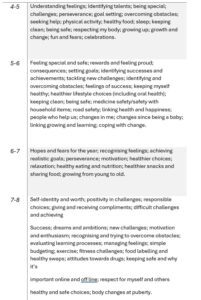
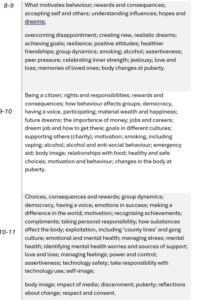
4.2.3 For those Academies not using Jigsaw, the content needs to be in-line with legislation and take into account guidance, including the PSHE Association framework.
4.2.4 An example may look like the following overview:
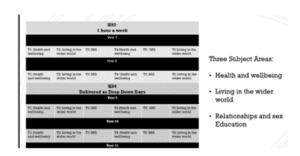
4.3 Differentiation/SEND
4.3.1 As will all subjects, teachers will need to tailor each lesson to meet the needs of the children in their class.
4.3.2 They will consider:
· How the needs of particular pupils will be met
· How provision is inclusive of all pupils and consistent with the Equality Act
4.4 Safeguarding
The school has a separate Safeguarding and Child Protection Policy. RHSE, Online Safety, PSHE – all play an important part in helping children to understand the difference between safe and unsafe relationships and equips them with the skills to get help if they need it. Effective RSE may bring about disclosures of child protection issues and staff are fully aware of the procedures for reporting their concerns. Safeguarding through the curriculum is an essential aspect of the enactment of this policy. Children are taught about how to stay safe online, through both the RSHE and the computing curriculum, in addition to the broader PSHE curriculum.
4.4.1 Teachers need to be aware that sometimes disclosures may be made during RHSE lessons; in which case, safeguarding procedures must be followed immediately. Sometimes it is clear that certain children may need time to talk one-to-one after the lesson closes. It is important to allow the time and appropriate staffing for this to happen. If disclosures occur, the school’s disclosure and/or confidentiality policy is followed.
4.5 Monitoring and evaluation
4.5.1 The RHSE leader will monitor delivery of the programme through observation and discussion with teaching staff to ensure consistent and coherent curriculum provision.
4.5.2 Evaluation of the programme’s effectiveness will be conducted on the basis of:
· Pupil and teacher evaluation of the content and learning processes
· Staff meetings to review and share experience
4.6 External contributors
4.6.1 External contributors from the community, e.g. health promotion specialists, school nurses, social workers, and community police and fire officers, make a valuable contribution to the RHSE and PSHE curriculum. Their input is carefully planned and monitored so as to fit into and complement the learning.
4.6.2 Teachers/leaders are always be present during these sessions and remain responsible for the delivery of the RHSE programme.
The July 2024 Draft Statutory Guidance contains the following:
Whilst it is recognised that new DRAFT statutory guidance has been issued, schools are currently expected to consider the most appropriate curriculum content based on their context and their students so this is included here for reference only at this stage. The following is a statement from the PSHE Association regarding the draft guidance and relating specifically to the age restriction aspects:
A key part of a PSHE teacher’s job is therefore to ensure teaching is not only age but also stage appropriate, using assessment techniques, knowledge of the pupils in their classes, local and national health data and professional judgement. Proposed age restrictions fail to recognise this crucial part of PSHE teaching or its importance in ensuring that education can be genuinely preventative.
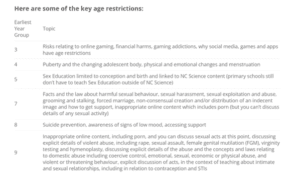
By the end of primary school: Families and people who care for me
Pupils should know
• that families are important for children growing up because they can give love, security and stability.
• the characteristics of healthy family life, commitment to each other, including in times of difficulty, protection and care for children and other family members, the importance of spending time together and sharing each other’s lives.
• that others’ families, either in school or in the wider world, sometimes look different from their family, but that they should respect those differences and know that other children’s families are also characterised by love and care.
· that stable, caring relationships, which may be of different types, are at the heart of happy families, and are important for children’s security as they grow up.
• that marriage13 represents a formal and legally recognised commitment of two people to each other which is intended to be lifelong.
• how to recognise if family relationships are making them feel unhappy or unsafe, and how to seek help or advice from others if needed.
Caring friendships
Pupils should know
• how important friendships are in making us feel happy and secure, and how people choose and make friends.
• the characteristics of friendships, including mutual respect, truthfulness, trustworthiness, loyalty, kindness, generosity, trust, sharing interests and experiences and support with problems and difficulties.
• that healthy friendships are positive and welcoming towards others, and do not make others feel lonely or excluded.
• that most friendships have ups and downs, and that these can often be worked through so that the friendship is repaired or even strengthened, and that resorting to violence is never right.
• how to recognise who to trust and who not to trust, how to judge when a friendship is making them feel unhappy or uncomfortable, managing conflict, how to manage these situations and how to seek help or advice from others, if needed.
Respectful relationships
Pupils should know
• the importance of respecting others, even when they are very different from them (for example, physically, in character, personality or backgrounds), or make different choices or have different preferences or beliefs.
• practical steps they can take in a range of different contexts to improve or support respectful relationships.
• the conventions of courtesy and manners.
• the importance of self-respect and how this links to their own happiness.
• that in school and in wider society they can expect to be treated with respect by others, and that in turn they should show due respect to others, including those in positions of authority.
· about different types of bullying (including cyberbullying), the impact of bullying, responsibilities of bystanders (primarily reporting bullying to an adult) and how to get help.
• what a stereotype is, and how stereotypes can be unfair, negative or destructive.
• the importance of permission-seeking and giving in relationships with friends, peers and adults.
Online relationships
Pupils should know
• that people sometimes behave differently online, including by pretending to be someone they are not.
• that the same principles apply to online relationships as to face-to-face relationships, including the importance of respect for others online including when we are anonymous.
• the rules and principles for keeping safe online, how to recognise risks, harmful content and contact, and how to report them.
• how to critically consider their online friendships and sources of information including awareness of the risks associated with people they have never met.
• how information and data is shared and used online.
Being safe
Pupils should know
• what sorts of boundaries are appropriate in friendships with peers and others (including in a digital context).
• about the concept of privacy and the implications of it for both children and adults; including that it is not always right to keep secrets if they relate to being safe.
• that each person’s body belongs to them, and the differences between appropriate and inappropriate or unsafe physical, and other, contact.
• how to respond safely and appropriately to adults they may encounter (in all contexts, including online) whom they do not know.
• how to recognise and report feelings of being unsafe or feeling bad about any adult.
• how to ask for advice or help for themselves or others, and to keep trying until they are heard.
• how to report concerns or abuse, and the vocabulary and confidence needed to do so.
• where to get advice e.g. family, school and/or other sources.
By the end of secondary school:
Schools should continue to develop knowledge on topics specified for primary as required and in addition cover the following content by the end of secondary:
Families
• that there are different types of committed, stable relationships.
• how these relationships might contribute to human happiness and their importance for bringing up children.
• what marriage is, including their legal status e.g. that marriage carries legal rights and protections not available to couples who are cohabiting or who have married, for example, in an unregistered religious ceremony.
• why marriage is an important relationship choice for many couples and why it must be freely entered into.
• the characteristics and legal status of other types of long-term relationships.
• the roles and responsibilities of parents with respect to raising of children, including the characteristics of successful parenting.
• how to: determine whether other children, adults or sources of information are trustworthy: judge when a family, friend, intimate or other relationship is unsafe (and to recognise this in others’ relationships); and, how to seek help or advice, including reporting concerns about others, if needed.
Respectful relationships, including friendships:
Respectful relationships, including friendships Pupils should know
• the characteristics of positive and healthy friendships (in all contexts, including online) including: trust, respect, honesty, kindness, generosity, boundaries, privacy, consent and the management of conflict, reconciliation and ending relationships. This includes different (non-sexual) types of relationship.
· practical steps they can take in a range of different contexts to improve or support respectful relationships.
• how stereotypes, in particular stereotypes based on sex, gender, race, religion, sexual orientation or disability, can cause damage (e.g. how they might normalise non-consensual behaviour or encourage prejudice).
• that in school and in wider society they can expect to be treated with respect by others, and that in turn they should show due respect to others, including people in positions of authority and due tolerance of other people’s beliefs.
• about different types of bullying (including cyberbullying), the impact of bullying, responsibilities of bystanders to report bullying and how and where to get help.
• that some types of behaviour within relationships are criminal, including violent behaviour and coercive control.
• what constitutes sexual harassment and sexual violence and why these are always unacceptable.
• the legal rights and responsibilities regarding equality (particularly with reference to the protected characteristics as defined in the Equality Act 2010) and that everyone is unique and equal.
Online and media
Pupils should know:
• their rights, responsibilities and opportunities online, including that the same expectations of behaviour apply in all contexts, including online.
• about online risks, including that any material someone provides to another has the potential to be shared online and the difficulty of removing potentially compromising material placed online.
• not to provide material to others that they would not want shared further and not to share personal material which is sent to them.
• what to do and where to get support to report material or manage issues online.
• the impact of viewing harmful content.
• that specifically sexually explicit material e.g. pornography presents a distorted picture of sexual behaviours, can damage the way people see themselves in relation to others and negatively affect how they behave towards sexual partners.
• that sharing and viewing indecent images of children (including those created by children) is a criminal offence which carries severe penalties including jail.
• how information and data is generated, collected, shared and used online.
Being safe
Pupils should know
· the concepts of, and laws relating to, sexual consent, sexual exploitation, abuse, grooming, coercion, harassment, rape, domestic abuse, forced marriage, honour-based violence and FGM, and how these can affect current and future relationships.
• how people can actively communicate and recognise consent from others, including sexual consent, and how and when consent can be withdrawn (in all contexts, including online).
Intimate and sexual relationships, including sexual health
Pupils should know
• how to recognise the characteristics and positive aspects of healthy one-to-one intimate relationships, which include mutual respect, consent, loyalty, trust, shared interests and outlook, sex and friendship.
• that all aspects of health can be affected by choices they make in sex and relationships, positively or negatively, e.g. physical, emotional, mental, sexual and reproductive health and wellbeing.
• the facts about reproductive health, including fertility, and the potential impact of lifestyle on fertility for men and women and menopause.
• that there are a range of strategies for identifying and managing sexual pressure, including understanding peer pressure, resisting pressure and not pressurising others.
• that they have a choice to delay sex or to enjoy intimacy without sex.
• the facts about the full range of contraceptive choices, efficacy and options available.
• the facts around pregnancy including miscarriage.
• that there are choices in relation to pregnancy (with medically and legally accurate, impartial information on all options, including keeping the baby, adoption, abortion and where to get further help).
• how the different sexually transmitted infections (STIs), including HIV/AIDs, are transmitted, how risk can be reduced through safer sex (including through condom use) and the importance of and facts about testing.
• about the prevalence of some STIs, the impact they can have on those who contract them and key facts about treatment.
• how the use of alcohol and drugs can lead to risky sexual behaviour.
• how to get further advice, including how and where to access confidential sexual and reproductive health advice and treatment.
Since September 2020 parents can only opt to withdraw their child from sex education elements of RSHE (not relationship elements), up to and until three terms before the child turns 16. After that point, if the child wishes to receive sex education rather than be withdrawn, the school must make arrangements to provide the child with sex education during one of those terms.
Jigsaw mapping – this is provided as a guide only. Not all CLF settings use Jigsaw as a resource to support the content taught. It is only one part of the overall picture of provision taught through the curriculum strands.
4.6.3 The grid below shows specific Relationship and Sex Education content for each year group:
AGE
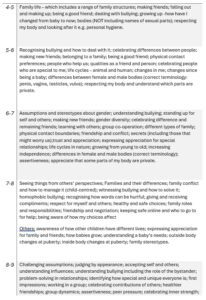
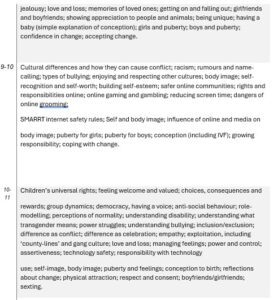
Legislation:
· Education (Independent School Standards) Regulations 2014;
· Where relevant for a particular school: Statutory framework for the Early Years Foundation Stage (DfE, March 2017)
· Education and Skills Act 2008
· Education Act 2002
· Children Act 1989 (where relevant for a school within the Federation)
· Childcare Act 2006 (where relevant for a school within the Federation)
· Equality Act 2010
· Children and Families Act 2014
· Children and Social Work Act 2017
· Data Protection Act 2018 and General Data Protection Regulation (GDPR)
· Relationships Education, Relationships and Sex Education and Health Education (England) Regulations 2019
· Smoke-free (Premises and Enforcement) Regulations 2006
Guidance – a number of these documents will require review and update following the mid-year review in line with DfE publications
· DfE Relationships education, relationships and sex education and health education (DfE, June 2019)
· https://assets.publishing.service.gov.uk/media/66d7301b9084b18b95709f75/Keeping_children_safe_in_education_2024.pdf
. https://assets.publishing.service.gov.uk/media/669e7501ab418ab055592a7b/Working_together_to_safeguard_children_2023.pdf
Please note this document is now updated and several key changes come into effect in January 2025 across Local Authorities.
· Sexting in schools and colleges: responding to incidents and safeguarding young people (UK Council for Child Internet Safety, August 2016)
· Multi-agency statutory guidance on female genital mutilation (HM Government, April 2016);
· Sexual violence and sexual harassment between children in schools and colleges (DfE, May 2018);
· Searching, screening and confiscation: advice for schools (DfE, January 2018)
· Relationships education, relationships and sex education and health education FAQs (DfE, May 2018), the Government response to draft Relationships education and relationships and sex education (RSE) and health education guidance
· Preventing and tackling bullying: Advice for Headteachers, staff and governing bodies (DfE, July 2017)
· DfE guidance on Equality Act 2010: Advice for school leaders, school staff, governing bodies and local authorities (DfE, 2014)
· Relationships, sex and health education: guide for schools (DfE, June 2019), DfE guide for parents that schools can use to communicate about teaching relationships and health education
· Testing for substance misuse in schools (Medical Officers of Schools Association, October 2015);
· DfE and ACPO drug advice for schools (Department for Education and Association of Chief Police Officers, September 2012)
· Searching, screening and confiscation: advice for schools (DfE, January 2018)
· Drug penalties guidance (Gov.uk)
